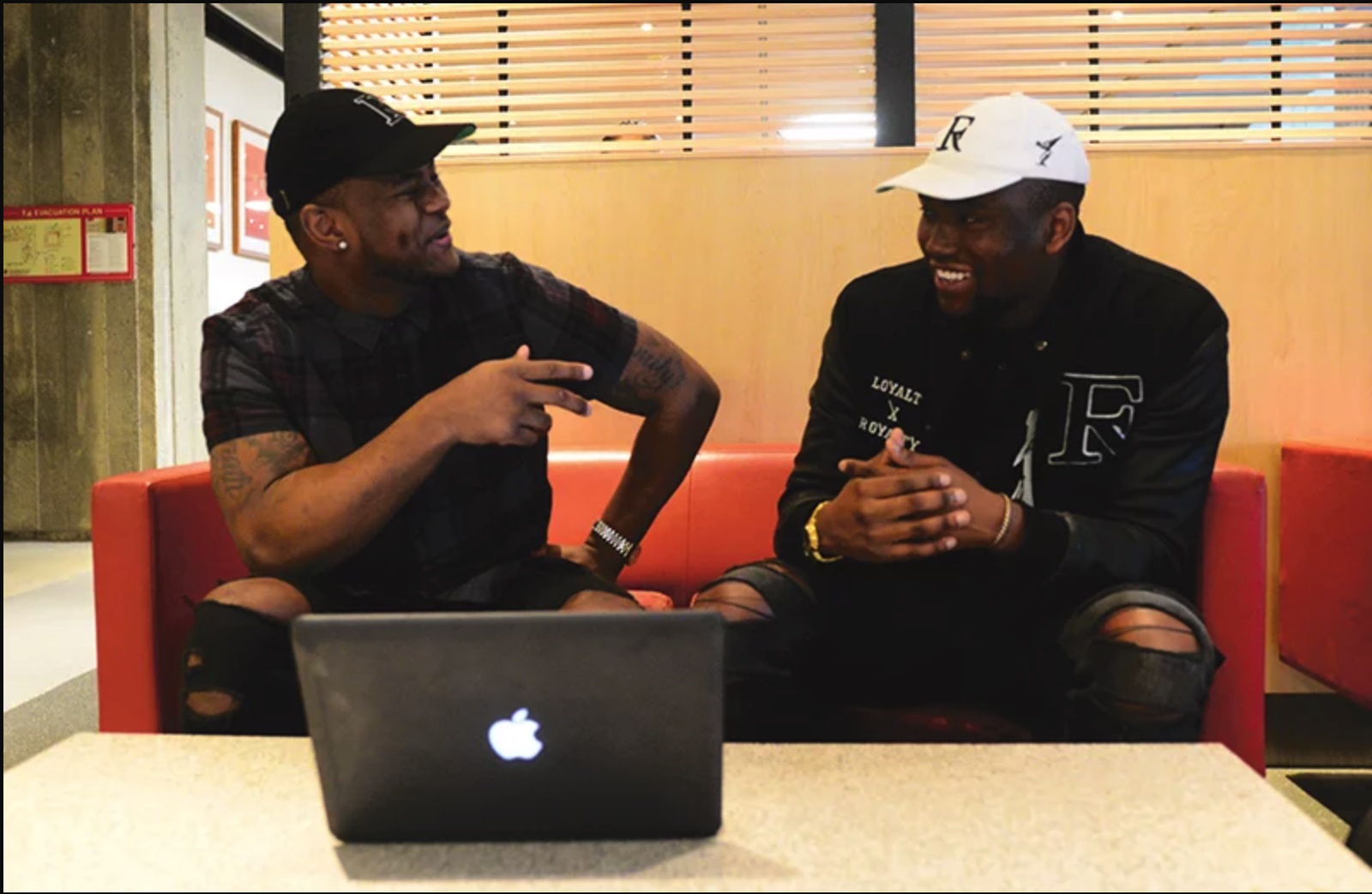These are the words that inspired Joshua Jackai and Buk Nkosi, two SFU students and business partners, to build their brand Frontrvnners Streetwear. At a young age, Jackai would spend hours designing and creating clothing when his family couldn’t afford to splurge on it. In 2012, he and some friends launched World Class Frontrvnners in Hayward, California.
Jackai took a break from Frontrvnners in 2013 when he came to SFU on a football scholarship. Nkosi arrived in Summer 2015 from Zimbabwe. When the two met in spring 2015, they teamed up, and have used their passions to build a streetwear brand they love.
I had a chance to sit down with Jackai and Nkosi to find out more about them, and learn how their experiences have been influenced by their time at SFU.
The Peak: Obligatory icebreaker: when did you start at SFU; what’s your major?
Josh: I’m from Hayward, California, about 15 minutes south of San Francisco. I came to SFU on a football scholarship in spring, 2013. I major in communications and I’m in my last year here.
Buk: I came to SFU from Zimbabwe in spring 2014, majoring in communications with a minor in business, and a certificate in entrepreneurship and innovation.
P: What made you decide on SFU?
J: I wanted to experience something new here at SFU and try to grow. Back home, there wasn’t a lot around that was productive so it’s nice to experience another country. And the scholarship of course.
B: I had no particular reason to decide on SFU. I talked to a rep back home and I liked him so I decided to come here.
P: And how did you two meet?
J: Buk and I met in spring 2015 and since then things have taken off for the company.
P: What was your inspiration to start the company?
J: Personal morals and principles. Growing up [in California,] I always told myself to succeed and get out of that environment, [which] inspire[s] the message behind the company. One of my role models is Scott Sasso, from 10 Deep. He does a lot of the work in his company and makes sure it’s done well. Of course, my mom inspired me too. She instilled perseverance in me.
P: Have you always had a passion for clothing?
J: It developed indirectly. Back in elementary school, we weren’t always able to buy the nicest clothes. My mom would have to put stuff on layaway. I found myself trying extra hard to make my outfits look better than what they actually were. Me being self-conscious made me put things together [in a unique way]. Ever since then, I’ve been very interested in fashion.
B: Somewhat, I’ve always thought, “[I’ll] wear clothes anyway, so what will I be comfortable in?” People have said I have a unique sense of style but it doesn’t just apply to fashion. I like to do things that I think are appropriate for me, not just what’s dictated or the “right way.”
P: How has SFU contributed to the company’s success?
J: Being a communications major, it taught me media and marketing and how to implement ideologies, mindsets, and identities, and how to build an image off that. Before I met Buk, I did everything on my own but you can only get so far doing it that way. I’m more of an introvert and I won’t go up to people and tell them about the brand, but Buk is the complete opposite and even if he doesn’t know you, he’ll go up and be friendly like he knows you. So definitely my education here at SFU, but meeting the right people [has been valuable as well]. Fashion week at SFU, too, forced us to step up our game and produce a lot of clothing and content for it. It allowed us to get the word out.
P: Aside from the company, what has your time at SFU done for you?
J: SFU showed me how to see the intellectual side of business. Mindsets and how people think.
B: The knowledge from the business and communications courses I’ve done have helped me understand people in a business context, how people receive information. The most important thing aside from education is the opportunity to interact with different people. Like professors who are mentors, and interacting with different clubs like the ASA, Brooked Events, The Schedule, being a CA on residence; everybody you meet enriches your mind. It’s been amazing meeting different people from different groups. I definitely wouldn’t be the same person would I have gone to a different school.
P: Is it difficult balancing work, life, school, and everything?
J: Somewhat, but I find it just gives me less time to do unproductive things. Last semester was my most stressful term but also my most productive academically. Being busy diminishes the unproductive habits. If you manage it well, it works fine.
B: If you’re doing something you like then it’s not really work. My courses, this brand, and everything, it’s all things that I want to do. We do things like this brand not for money but for pure passion of it. We love it and we want it to continue.
P: What are your goals after SFU?
J: I might do a certificate in entrepreneurship once I’m done my bachelor’s, but otherwise I’m done in the summer. I want to continue building this brand because I don’t believe in working towards something I don’t believe in. I want to be able to support myself, support a family, but also give back to the community. Where I’m from it’s pretty much like the ghetto. People think the only way to get out is to sell drugs, play sports, or rap. They don’t know that you can get out through academics [. . .] so I’d like to be a role model and open up doors to show that there is another way.
P: What advice do you have for young people and SFU students?
J: Not to sound too cliché, but take matters into your own hands and control your own destiny. A lot of people focus on too many things and don’t chase what they’re really after. I heard something on a Logic track that said it’s better to live a short life filled with things you like doing than a long life spent in a miserable way. A lot of students I talk to, they don’t really know what they want to do and they feel lost. One thing I did, sit down, and write an obituary about yourself. It helps give you direction, what do you want to be remembered as, and what does your family think about you.
B: Make use of your time at SFU. Some of the coolest people I’ve met came about by random conversation on campus. All it takes is a “hello,” or if there’s a prof you like, just go up and talk to them about stuff. It enriches your life and makes school much more enjoyable. Know the value of putting yourself out there. It may seem scary, but don’t make assumptions about how people will receive you. Not everybody thinks the same way.
P: So SFU is more than just academics?
B: It’s way more. SFU is what you make it. Some people say it’s boring and not a lot happens at SFU, but so much happens that you can never have enough time for it. The experience won’t look for you, you have to create it. You can have any type of experience you want here.


